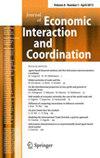你觉得环保怎么样?在日益开放的经济中模拟环境情绪
IF 1
4区 经济学
Q3 ECONOMICS
引用次数: 1
摘要
与科学界几乎达成的全球共识相反,各国公众对气候变化的看法不同,并且随着时间的推移而波动。本文开发了一个转换策略增长模型来研究这样一个风格化的事实,考虑到开放经济环境中情绪、环境监管和宏观经济结果之间的反馈效应。以主体之间的相互作用水平为条件,出现了两个局部稳定的平衡点:一个是大多数人口支持气候变化缓解政策,另一个是大部分主体反对环境监管。然而,我们证明,对温室气体排放的情绪反应足够强烈,可能会导致低增长“坏”平衡的消失,从而形成独特的“绿色”稳态。复杂的动力学可能通过一系列周期加倍的分叉发生。根据世界风险调查等调查中的证据,该模型提供了一种内生机制来解释公众对全球变暖的小波动和大波动。就业序列比情绪更持久,导致后者的波动性相对较高,并使劳动力市场的长波平稳。本文章由计算机程序翻译,如有差异,请以英文原文为准。
How do you feel about going green? Modelling environmental sentiments in a growing open economy
Contrary to the near-global consensus among the scientific community, public perceptions of climate change differ between nations and have fluctuated over time. This article develops a switching-strategies growth model to study such a stylised fact, allowing for feedback effects between sentiments, environmental regulation and macroeconomic outcomes in an open economy set-up. Conditional on the level of interaction between agents, two locally stable equilibrium points emerge: one with the majority of the population supporting climate change mitigation policies and another with most agents opposing environmental regulation. However, we demonstrate that a sufficiently robust response of sentiments to green house gas emissions may lead to the disappearance of the lower growth “bad” equilibrium, allowing for a unique “green” steady-state. Complex dynamics might occur via a sequence of period-doubling bifurcations. The model provides an endogenous mechanism to explain minor and large fluctuations in public opinion on global warming, in line with the evidence in surveys such as the World Risk Poll. Employment series are more persistent than sentiments, resulting in relatively high volatility in the latter and smooth long-waves in the labour market.
求助全文
通过发布文献求助,成功后即可免费获取论文全文。
去求助
来源期刊
CiteScore
2.20
自引率
18.20%
发文量
33
期刊介绍:
Journal of Economic Interaction and Coordination addresses the vibrant and interdisciplinary field of agent-based approaches to economics and social sciences.
It focuses on simulating and synthesizing emergent phenomena and collective behavior in order to understand economic and social systems. Relevant topics include, but are not limited to, the following: markets as complex adaptive systems, multi-agents in economics, artificial markets with heterogeneous agents, financial markets with heterogeneous agents, theory and simulation of agent-based models, adaptive agents with artificial intelligence, interacting particle systems in economics, social and complex networks, econophysics, non-linear economic dynamics, evolutionary games, market mechanisms in distributed computing systems, experimental economics, collective decisions.
Contributions are mostly from economics, physics, computer science and related fields and are typically based on sound theoretical models and supported by experimental validation. Survey papers are also welcome.
Journal of Economic Interaction and Coordination is the official journal of the Association of Economic Science with Heterogeneous Interacting Agents.
Officially cited as: J Econ Interact Coord

 求助内容:
求助内容: 应助结果提醒方式:
应助结果提醒方式:


